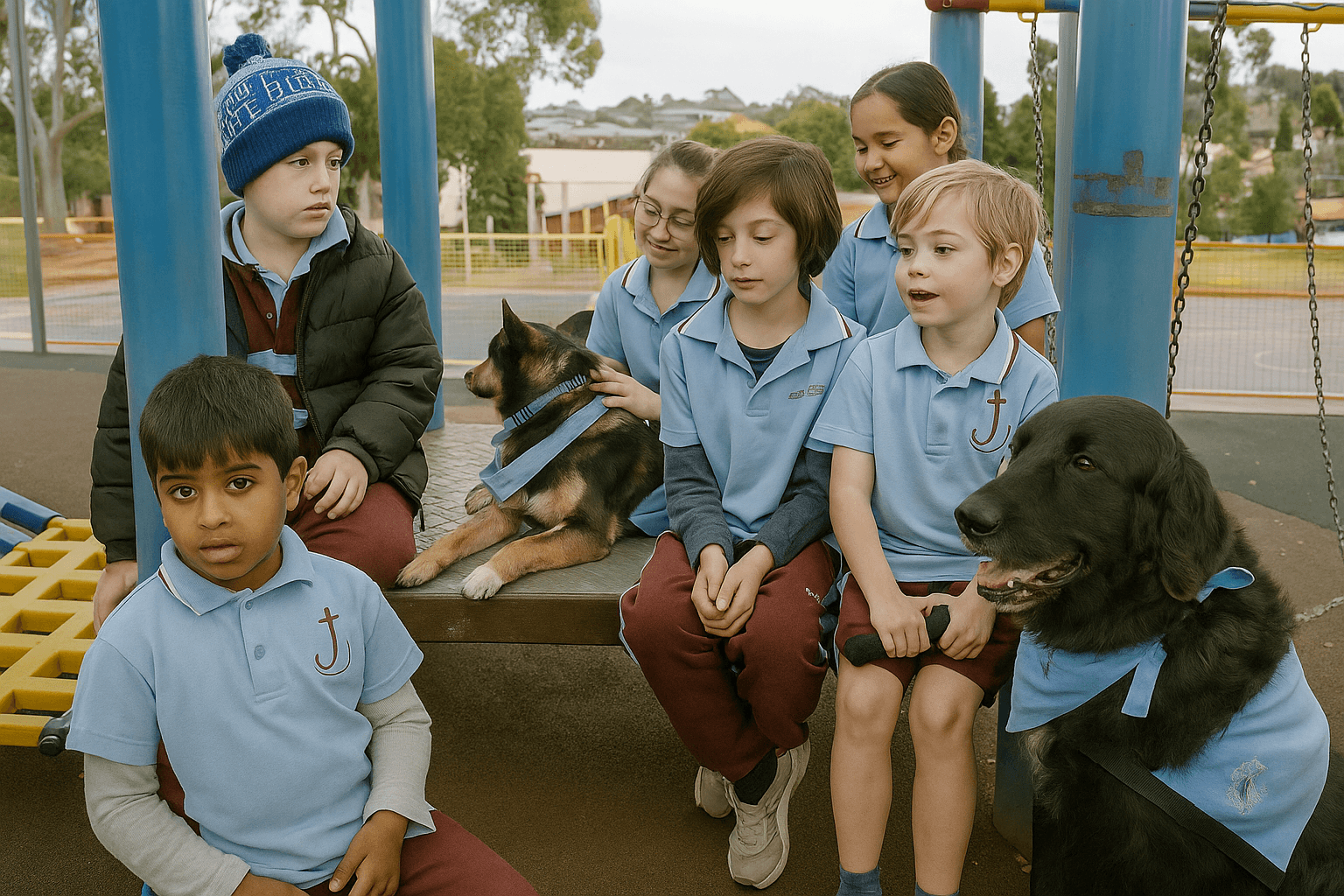Therapy Dog Misconceptions: Demystifying the Myths
Therapy DogsIt’s easy to get lost in the terminology surrounding assistance animals. This article aims to clarify common myths and misconceptions about therapy dogs, emotional support animals, and service dogs, so you have the right information.
Paws For Support helps individuals across Australia to train and certify their own therapy dogs, ensuring these animals can safely and confidently provide emotional support in schools, clinics, aged care, and other community settings. Our programs focuses on assessing suitability, encouraging safe practices, and offering real-world guidance – without the need for expensive training when it is not necessary.
Key Differences Between Assistance Dogs, Therapy Dogs and ESAs
One of the most common misconceptions is confusing emotional support animals (ESAs) with therapy dogs and assistance dogs. In Australia, “service dogs” are officially referred to as assistance dogs. These animals are specially trained to perform tasks that alleviate the effects of a person’s disability and are protected under the Disability Discrimination Act 1992. They have public access rights, allowing them to accompany their handler in places where animals are usually not permitted.
A therapy dog, on the other hand, is typically part of a therapy team, a trained handler and dog, who provide comfort and support in settings like schools, aged care, or counselling rooms. These dogs may be assigned to a specific facility or participate in scheduled wellbeing visits.
An emotional support animal simply offers comfort through its presence. ESAs are not trained to perform specific tasks related to a person’s disability and therefore do not have public access rights in Australia.
While all three roles can offer emotional benefits, the key difference lies in training, certification and legal recognition. Only assistance dogs are trained to directly assist with specific tasks and are legally recognised as essential aids for people with disabilities.
Myth 1: Therapy Dog Certification Is Too Expensive Because Special Training Is Required
Reality: You don’t need to spend thousands to certify a therapy dog.
Many people believe therapy dog certification demands expensive, long-term training programs, but that’s simply not true. If your dog is calm, friendly, and well-behaved, you may be eligible for certification without formal training at all.
The key factor is not how much training your dog has had, it’s whether your dog can pass a thorough assessment of temperament, obedience, and behaviour in public or therapeutic environments. (check out our article on obedience and temperament for therapy dogs) Many dogs already have the right qualities, especially if they’re well-socialised and responsive to basic commands.
At Paws For Support, we focus on making certification accessible and realistic, not overwhelming or costly. Our team helps you identify your dog’s readiness and only recommends additional training if it’s truly needed.
Myth 2: Only Certain Breeds Can Be Therapy Dogs
Reality: All breeds, from Labradors to mixed rescues can qualify. What matters is your dog’s temperament, not its pedigree.
Another widespread misconception is that only specific breeds, such as Golden Retrievers or Labradors, are suitable for therapy work. This simply isn’t true. The truth is, a dog’s breed is far less important than its individual temperament and disposition. Whether it’s a purebred or a rescue, any dog demonstrating a calm, friendly, and adaptable nature can excel as a therapy animal.
Myth 3: Therapy Dogs Are the Same as Assistance Dogs
Reality: Therapy dogs provide emotional support in schools, clinics, or community settings. They are not trained to perform tasks or protected under disability access laws like assistance dogs.
A significant misconception involves confusing therapy dogs with assistance dogs(or service dogs). While both provide immense benefits, their roles and legal protections differ considerably. Therapy dogs offer comfort and emotional support in various public settings, whereas an assistance dog is specifically trained to perform tasks directly related to an individual’s disability and has protections under the Disability Discrimination Act.

Myth 4: My Dog Has to Be a Puppy to Qualify
Reality: Dogs of all ages can be assessed. In fact, older dogs often make better therapy dogs because they’re calmer and more settled.
It is a common misconception that only young dogs or puppies can be trained and certified as therapy animals because of their longer potential working life or “trainability window.” On the contrary, dogs of all ages are eligible for assessment. In many cases, older dogs prove to be exceptional therapy dogs due to their established calm demeanour, settled personalities, and often, a greater sense of patience and tolerance, making them ideal companions for those in need of comfort.
Myth 5: I Need Professional Qualifications to be a therapy Dog Handler
Reality: You don’t need to be a clinician or dog trainer. Volunteers, carers, educators, and everyday pet owners can all become part of a certified therapy dog team.
Many individuals are held back by the misconception that one must possess professional qualifications as a clinician or dog trainer to become a therapy dog handler. This is entirely unfounded. The path to becoming a certified therapy dog team is open to a wide range of dedicated individuals, including volunteers, carers, educators, and everyday pet owners who are committed to providing emotional support and comfort through their beloved dogs.
You don’t need to spend thousands to certify your dog, here’s what really matters.
Many people operate under the misconception that becoming a therapy dog team requires an exorbitant financial investment, believing it to be an exclusive process or restricted to specific dog breeds. The reality is far more inclusive; most calm, well-mannered dogs possess the innate qualities to become certified, with proper preparation and assessment of their temperament being the true determinants. Let’s dispel five significant common myths that often deter passionate dog owners from pursuing this rewarding path.
Register to attend our pre-assessment sessions or learn more by visiting our therapy dog team program page, where you can download our…










